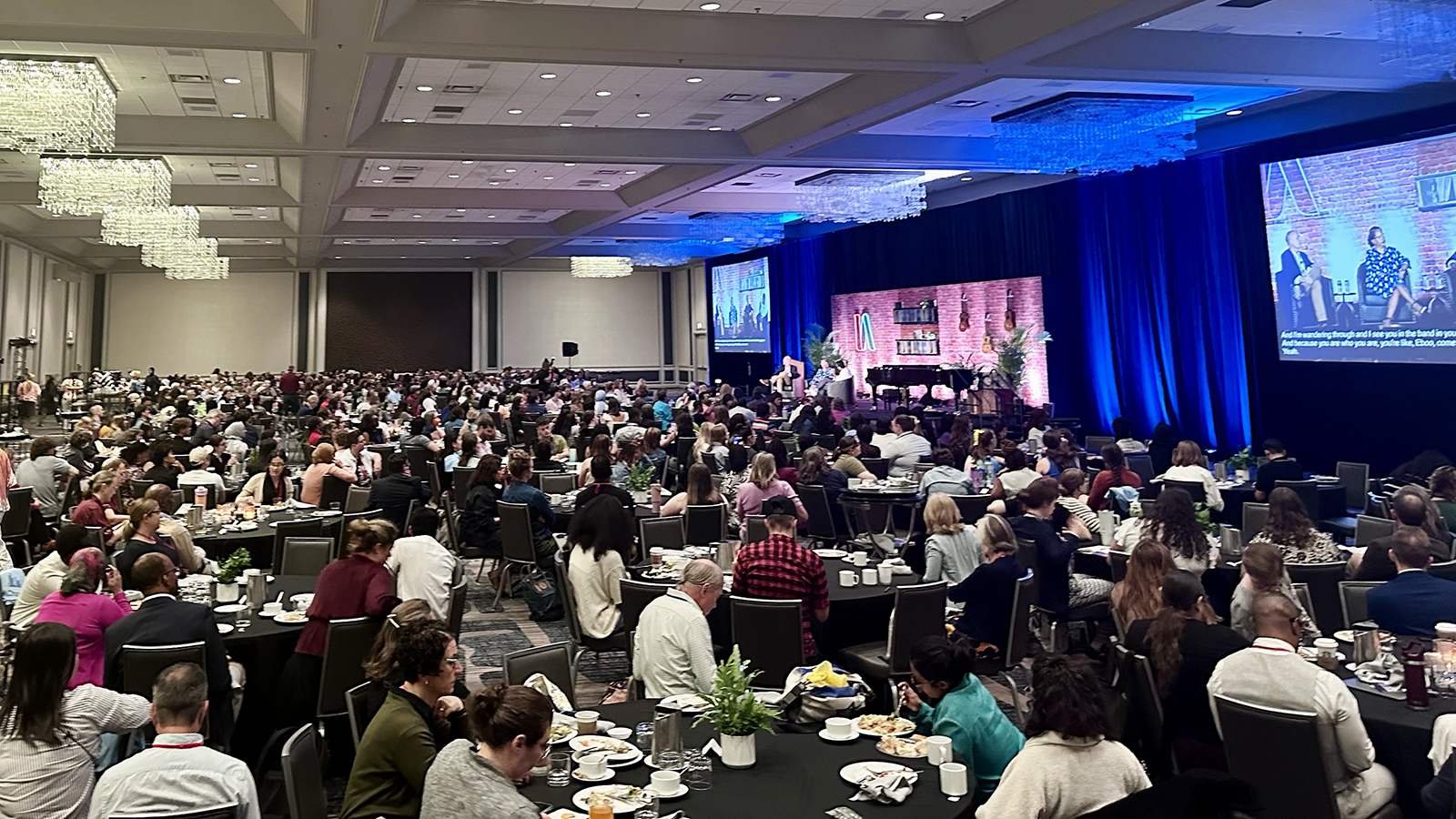
(RNS) — At a hotel in Chicago in recent days, scores of Jewish and Muslim students, educators and emerging leaders gathered to talk about diversity in higher education. The news is that everyone got along.
There was no shouting, no signs, no chants. We listened and shared, not pretending to agree, but caring to understand each other and hear each other’s pain. As the devastating situation in Israel and Gaza raged on and the “conflict about the conflict” continued in North America, the annual Interfaith Leadership Summit had its largest turnout in our organization’s history. More than 700 college students, higher education professionals, health care experts, workplace innovators and bridge builders came together for a weekend of connection, conversation and collaboration.
It was almost impossible to walk through the lunch buffet without seeing someone who was proudly sporting a watermelon pin engaging amiably with someone wearing an Israeli flag pin. I saw two students from the same campus, who had likely spent hours organizing counterprotests, connect over how the conflict had created divisions within their families.
On Friday evening, a Muslim woman introduced the author of “The Children of Willesden Lane,” a Holocaust memoir, by relating how she had encouraged her Palestinian son to read the book to help him process his despair over Gaza.

Attendees take photos together during the Interfaith Leadership Summit in Chicago. (Photo by Cameron Dreher-Siefkes/Interfaith America)
You may be surprised to hear all of this. Our media feed us a steady diet of confrontation and rarely shows us the camaraderie of genuine human connection. But the success of the IA summit proves something essential to the American mission of pluralism: There is no America, and no American system of higher education, without people from different backgrounds learning, in both ordinary and extraordinary ways, how to live, cooperate and flourish together.
Walking the halls of the Chicago Marriott, what struck me most was how familiar it all felt — like every summit since 2007, and like the best of American higher education for nearly three centuries. I first experienced this as an undergraduate in the early 2000s, during the Second Intifada. My campus had few Jews and even fewer Muslims — most were international students from Pakistan — but we met, we talked and, often, we laughed. Conversations often returned to food. I asked Usman why he drank beer if Islam forbids alcohol; he asked why I, as a Jew, ate bacon.
I remember that many Muslim students became vegetarians because there was no halal meat on campus. One day, Usman — I was then Hillel president — proposed that I join him in advocating for kosher meals, which under many Islamic interpretations would also be halal. We had already collaborated to launch our college’s first Muslim Students Association, so I said yes.
With support from the dean of religious and spiritual life, we met with administrators and proposed concrete solutions. By the time I graduated in 2004, Shabbat dinners at a small dining hall featured kosher meat — and every Friday night, Muslim and Jewish students filled the room, singing Shabbat songs, exchanging salams, and delighting in carnivorism.
That is, and remains, a crucial part of the everyday work of higher education: helping young people from different backgrounds, with different notions of everything from food to justice, learn to have generative conversations and work together for the common good. This work is fragile yet persistent.
It’s fragile because confrontation and passionate disagreement crowd out the ordinary ways we respect, support and accommodate each other. Interfaith understanding requires a daily recommitment from students and educators to its ideals and the sometimes challenging practices that make them real. Higher education has fallen short countless times. Which is why, at a moment of deep polarization and distrust, it must rededicate itself — and invest — in mindsets and skills that foster respect, relationships and cooperation across differences.
It’s persistent because all it takes to rejuvenate it, even in the face of despair, is attention to the ordinary ways we respect people of different backgrounds every day. This year’s summit was both exhilarating and, in the best way, ordinary. The students and educators who attended are at the vanguard of a growing movement to build cultures of pluralism — and they are also doing what generations before them have done: taking pride in their identities, celebrating diversity as a treasure, discovering faith as a bridge, insisting that cooperation is better than division and proving that we are all co-authors of the future we want to see.
Precisely because it is so fragile perhaps, there is a quiet beauty in the everyday work of building community out of diversity. It is rarely flashy, seldom headline-making — but it is always happening. And the responsibility falls to all of us to nourish it.
(Noah Silverman is vice president of strategic communications at Interfaith America. The views expressed in this commentary do not necessarily reflect those of Religion News Service.)
